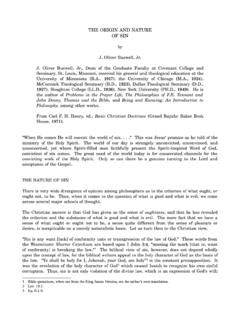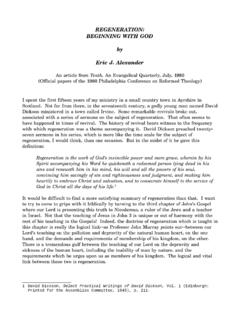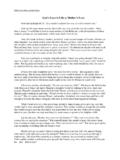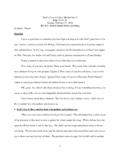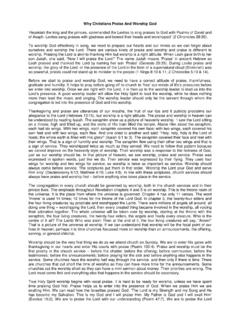Transcription of Sermon IV by William Nevins - rediscoveringthebible.com
1 Sermon IVbyWilliam Nevins "Who is a god like unto thee,that pardons iniquity?" (Micah 7:18)Ah, my hearers, if you only believed the truth! If you did but give credit to the statements of theBible, if you even believed what perhaps you profess to believe, if you held such views ofyourselves as the Bible expresses and such as accord with the matter of fact, and such as yourCreator entertains of you, how deeply interested you would all be in what I am going to saytoday. How would you be all eye, ear, attention and interest! God regards you, and the Bibledescribes you, as sinners; and so you are. It is seen. Is it not sometimes felt? I am certain it isconfessed.
2 Yes, sinners condemned and needing pardon, for condemnation follows sin as a matterof course. And to say that condemned persons need pardon is almost superfluous. When a manhas sinned there remains only the alternative of pardon or punishment. He must receive apardon or suffer the penalty. This is a perfectly clear case. I defy anybody to get away from thisdilemma. Therefore you, as having sinned, need pardon. You can have no expectation [of it], but[except it come] from mercy. Unless that prerogative is exercised by the proper authority inforgiving you, you are gone and lost, inevitably and irrecoverably. You must suffer the reason teaches you this. Now one great object of revelation is to tell you that you may be pardoned.
3 It was always knownthat God had the power of pardoning. It could not be lodged elsewhere. The legislative, judicial,and executive authority of the universe meet in him. But revelation informs us that God will anddoes exercise the prerogative of pardon. Nor does it merely reveal the fact, but [it] declares theground, the manner, and the conditions of pardon; why, how, and when he pardons. Now, how adiscourse on this subject would interest you, did you really believe yourselves condemned and didyou duly appreciate your need of pardon! But my object is not merely to present God before you as a pardoning God, but to show you whatthere is peculiar and distinguishing in his exercise of pardon.
4 "Who is like thee, pardoninginiquity?" There are not many points in which creatures resemble God. In intelligence and inholiness we bear some faint resemblance to him. But the attributes and ways of creatures are forthe most part in contrast to those of God. God is from everlasting; we are of yesterday. Hisunderstanding is infinite; we know nothing. We are unstable in all our ways; he [is] withoutvariableness or shadow of turning. But in nothing is God more unlike other beings than inpardoning. I would call your attention to an illustration of this truth. 1. No being pardons with such honor to the law broken, and with such security to the govern ment offended, as God.
5 The considerations which induce others to pardon are totally differentfrom those which move God. It is not any thing which does honor to the law. The governmentthat pardons is weakened. Justice is not satisfied. Its satisfaction is dispensed with. Thepenalty is not executed but remitted. There is no atonement made. But God lays a foundationfor pardon which involves the exaction of the penalty and the full satisfaction of justice. Hemagnifies the law whose violation he forgives, and honors the government while he spares therebel against its authority. He is as just in showing mercy as in exacting righteousness. Ouriniquities, in being taken off of us, are laid on Christ.
6 They are nonetheless borne, though notborne by us. We are not made a curse, but he was made a curse for us. We are healed, but it isby stripes inflicted on him. The Christian mind delights to dwell on this inspires the mind with such confidence as this. It is this chiefly which gives us boldnessin approaching the throne of grace to obtain mercy. If we had to reflect that justice is notsatisfied while mercy is exercised, and that God's character and government suffer in our beingsaved, we could feel no such confidence. But now we have not only mercy to appeal to, but [wehave] merit the merit of Christ to plead. We bring a righteousness, though not our own; yet allthe better for not being our own.
7 If God would not accept us, yet he will not fail to accept Christfor us, especially when it is his own plan and proposition. 2. No one pardons at such an expense to himself as God does. With others it is but saying theword or signing the name, and the person is pardoned. And the reason of this facility is that noattempt is made to reconcile the exercise of pardon with the claims of law and justice. If anysatisfaction is required, it is not made by the power that pardons. It must be made by the personneeding the pardon. But God, while he requires satisfaction, sees to the making of it. He takesthe whole business of atonement into his own hands. He takes the pains.
8 He bears the problem to reconcile the claim of justice with the exercise of mercy he undertakes to solve;and he does it. The idea of pardoning originated with him. The preliminaries of pardon wereaccomplished by him. Nothing was left to the sinner. Nothing now remains to him but gratefullyand cordially to accept the pardon. "God spared not his own son." Suppose we had beenassembled and it had been announced to us that we could only be pardoned on condition of God'ssending his own dear Son into the world to be insulted and despised, and to die ignominiously onthe cross. We should have had no hope. We would have said, "He will never do that.
9 " But hedid it. Who is like him? 3. No one pardons with such a good effect on the sinner pardoned. Men can pardon, but theycannot do it in a way to reform the criminal and to secure his future obedience. And thereforethey have often to regret that in particular cases they did not let justice take its course. They arenot infrequently sadly disappointed in those they pardon. But God was never disappointed in asinner he pardoned. Everyone he pardons becomes his servant, and though subject to manyimperfections and fluctuations, perseveres in his service to the end. Whenever he remits sins, hereforms the sinner. This result he secures in part by motives. There is much in the fact, andmore in the manner, of our being pardoned to bring us to repentance.
10 There is a softening andmelting influence in the cross, as well as a saving one. It is hard to go on sinning against suchlove and pity, to continue in a course which rendered such sorrows necessary. But chiefly hesecures this result by his Spirit, by whose influence the heart of the pardoned sinner is renewedand sanctified. It is a part of God's compassion to subdue our iniquities, as it is said in the nextverse. We see then how it is that he has never to regret an exercise of pardon, and that he neverloses a soul whose sins he has forgiven. 4. No one pardons so many as God. The prerogative of mercy among men is exercised generallywith respect to a few. A selection is made out of a number of criminals, generally on theprinciple of inferior guilt or circumstances of mitigation in their cases, and not even the offer ofpardon is made to the others.
